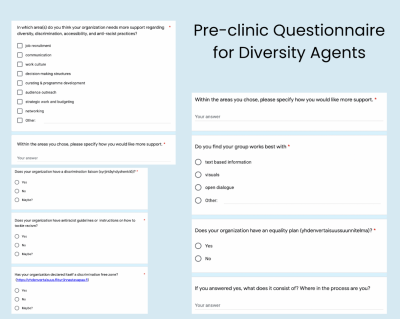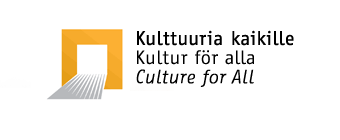Irina Duskova: Reflections from Diversity Agents’ Online Clinic: Strengthening and Advancing Anti-Racist Practices
I’m Irina Duskova, a theatre producer and diversity agent living in Finland. I write this article as a reflection on the diversity clinics that we, as Diversity Agent 2.0 course students, held in January and February 2022. These diversity clinics were focused on recognizing and tackling discrimination, learning more about diversity, equity and inclusion (DEI), and anti-racist practices. Inspired by online Museum Clinic Making the history of disability visible in museums (2020), organized by the project Vammaisuuden vaiettu historia (The silenced history of disability) and Culture for All, the idea of an online training clinic was added to the course curriculum.
The Diversity Agents course 2.0 was coordinated by the artist, diversity agent, and educator Arlene Tucker with Globe Art Point’s supporting visual artist and diversity agent Kemê Pellicer. They educated and mentored a group of 10 diverse arts and culture professionals sharing the aim to connect and widen the perspective and understanding of how to dismantle structural racism and promote equal voices for all.
Due to uncertain Covid times, the Diversity Agents 2.0 course was designed to be online. For 4 months, from September to December, with the help of our guest lectures, workshops, and group meetings we have been able to learn, unlearn, reflect and implement how we would like to make an impact on ending racism and discrimination. Through personal experience, we learned to recognise structural racism and biases embedded in our society and addressed the existing issues of lacking equity and accessibility. We practised the consent-driven decision-making process using Sociocracy principles developed by Gerard Endenburg while co-creating safer space guidelines and making decisions as a group. We have in a short amount of time connected with each other and formed an honest environment where we could talk about hard and uncomfortable issues whilst building on top of the skills we have in our own medium to bring it back to the community.
During January and February 2022, as a concluding part of the course, we conducted 5 online clinics with follow-up sessions for 5 cultural organisations located in Helsinki and Oulu, and varying from middle size established Finnish and Swedish-speaking theatre companies to a recently created organisation for the European Culture capital project. Each institution had 2 diversity agents facilitating the training. As diversity agents, we operate and promote dialogue as a form of considerate communication, be it in our course or with outside partners. Working in pairs was a deliberate choice for several reasons: we learned to collaborate with one another, put our new skills into action, and exchange our experience and knowledge bringing out our divergent personalities. Needless to say, each organisation benefited from our unique expertise and valuable insights.
Preparing an online clinic
A clinic is not a passive online webinar, nor is it a “one size fits all” solution to structural problems. An online clinic is designed as an hour-long introductory conversation facilitated by diversity agents pinpointing challenges within the given institution or team. Ideally, it is meant for 1-2 diversity agents and a group of 5-6 participants. This amount of people comfortably enables everyone to have a say and express themselves without being rushed. Giving voice to each participant is essential to the equal and empathetic dialogue that we strive for. During one hour agents introduce the terminology and concepts of DEI, anti-racist practices, and non-violent communication, facilitate 1-2 practical tasks and a discussion. This is later continued by a 30 minutes follow-up session where all the attendees can reflect on the learned information, share thoughts, needs and feelings, and possibly draft a diversity action plan for the organisation.
During the preparation process, our coordinator Arlene Tucker created a pre-questionnaire for organisations interested in the clinic, to help us understand the needs and expectations better. Pre-questionnaire had essential questions about diversity awareness, areas that need more support with discrimination, accessibility, and anti-racist practices, like communication and curatorial decisions, recruitment and work culture, etc. We also collected data about how people perceive information, visually or text-based, which helped design the clinic in a unique way for a specific group of participants. All in all, each training was created based on the specific needs and wishes of each organisation.

Reflections on facilitating a clinic
Here is an example of a clinic facilitated by me and fellow agent, cultural producer and independent curator, Olesia Kova.
We started our training with check-in and introduction, telling our pronouns and describing how we feel and look. A seemingly easy exercise, this brought smiles and a down-to-earth attitude to the group. A hostile unfamiliar online environment became humane and set a warm atmosphere for the following hour.
From the feedback form:
What was a memorable experience you had related to the Diversity Clinic?
Exercises, especially creating an accepting atmosphere at the beginning of the clinic.
The first practical task that we introduced was creating safer space / brave space guidelines for our meeting. A safe space policy is about creating an open and welcoming environment within our community and at our gatherings so that all participating members feel able to participate. We gave a few examples of how to formulate objectives and everybody expressed essential ideas and needs for a safe space. After the consent of all participants, we moved on to the terminology of DEI, and discussed participants' awareness of basic diversity concepts.
Based on the pre-questionnaire answers, we found out that all of the participants expressed a wish for support in communication. Due to the time constraint, we could not address all aspects of communication (inside the organisation, communication with artists and audiences, etc), therefore we decided to introduce Nonviolent Communication (NVC) principles with a practical task. Nonviolent communication is about listening and receiving empathetically. That is something that can improve inclusive and accessible communication inside the team. We had two volunteers from the group: one exercised expressing feelings and needs and the other tried empathetic listening and rephrasing the heard statement. According to the feedback we got later, this task was the most interesting and challenging, brought a lot of questions and self-reflection, as well as the need to learn more.
As a special request, we spoke about digital accessibility, multi-language websites, and technical possibilities for inclusion. And lastly, we discussed anti-racist practices and organisational accountability. Similar to the pre-questionnaire, we sent a general feedback form that we tailored to fit what was raised in the clinic. Participants acknowledged the lack of both theoretical and practical knowledge about diversity and anti-racist practices. Therefore, during our follow-up session, we got to reflect on the training and questions it brought, and what can be done to bring positive changes within and outside of the organisation. To our surprise, within two weeks between the clinic and follow-up meeting, leading members of the team have applied for funding for DEI development for upcoming years.
The experience we had with the clinic was positive for all the parties. We have witnessed the beginning of mindset change, willingness to learn, and seeking professional support. For me, as a diversity agent, the clinic was an important step in building professional confidence outside my comfort zone, applying knowledge in action, and empowering partnerships among diversity agents and culture professionals.
More information about the agents can be found on the Culture for All website: Diversity Agents.
About the author:
Irina Duskova is a cultural manager, theatre producer, curator, agent and diversity agent living in Helsinki. She has studied Theatre Management at the Lithuanian Theatre and Music Academy and International Cultural Policy Studies at Warwick University, UK.
For more information, please go here:
Irina Duskova’s Diversity Agent profile

Irina Duskova. Photo credit: Maria Baranova-Suzuki
